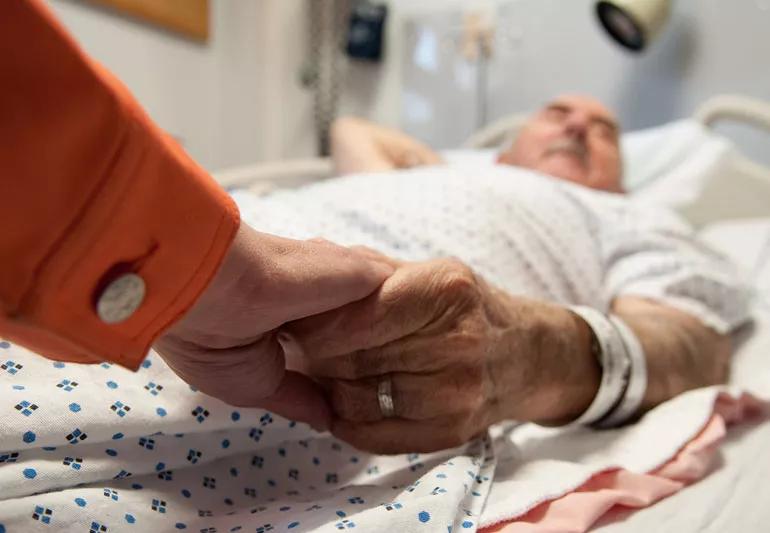The signs might be subtle

Image content: This image is available to view online.
View image online (https://assets.clevelandclinic.org/transform/ff4fd43d-6414-43b0-aea8-2c09856c21cd/elder2Hospital-182174810-770x533-1_jpg)
Elederly man in hospital bed with family holding hand
“I don’t feel well.”
Advertisement
Cleveland Clinic is a non-profit academic medical center. Advertising on our site helps support our mission. We do not endorse non-Cleveland Clinic products or services. Policy
Those four words can mean very different things depending on who says them — from “I ate too much at dinner” to “I’m having chest pain.” When it’s your aging parent or another older family member speaking, it sometimes means there’s something seriously wrong.
Judith Welsh, MD, FACEP, Associate Chief Experience Officer and Medical Director of Community Paramedicine, advises adult children to listen closely to these types of seemingly minor complaints. “In the ED, we’ve found they’re often related to a very serious underlying disease,” she says.
“If you’re concerned about the possibility of stroke or heart attack, call 911 immediately,” Dr. Welsh says.
Any symptom of vascular blockage, such as with a stroke, is an immediate cause for concern, she emphasizes. “Chest pain, weakness in the arm, legs or face, and slurred speech are common symptoms, but some people may just feel short of breath or exhausted.”
The signs of a heart attack are sometimes just as subtle.
“Elderly patients are less likely to have ‘typical’ symptoms of a heart attack, and they may look fine but actually have a life-threatening issue,” Dr. Welsh says. “Look for any signs of weakness, confusion or lethargy. Dizziness, falls and heartburn symptoms can also be signs of a heart attack.”
Advertisement
You’ll need to provide as complete a picture of your parent’s medical history as you can. Be prepared to provide a list of medications, health conditions and allergies.
You’ll also need to have your parent’s insurance information and a name and contact information for his or her doctor.
Don’t wait until there’s an emergency to prepare.
Identify and keep a list of phone numbers for two or three neighbors or friends who live near your aging parents. Ask them to help keep an eye on your parents regularly.
And then call on them to check in if your parents don’t answer the phone or if you think your parent sounds “off” when they talk to you.
Look up the local non-emergency number for police dispatch and keep that handy, also. “You can ask for a welfare check to make sure your parent is awake and alert and not having a medical crisis,” says Dr. Welsh.
Emphasize the risks of avoiding treatment. And call for backup if there’s a friend or family member who tends to get better results when persuading the person.
“Sometimes it’s even the primary care doctor or nurse who is more convincing to the person,” says Dr. Welsh.
Remember that your parent may be confused and may even start to panic.
Having a plan in place for an emergency you hope never happens can help you stay calm and do what it takes to get mom or dad the help they need as quickly as possible.
Advertisement

Sign up for our Health Essentials emails for expert guidance on nutrition, fitness, sleep, skin care and more.
Learn more about our editorial process.
Advertisement
Signs to look out for include pain and changes in frequency or urgency
Americans aged 65+ are at much higher risk for completing suicide than other demographics
Bleeding is a risk and warrants taking care, but the reward of this lifesaving medication is great
Severe and debilitating headaches can affect the quality of your child’s life
With repeat injections over time, you may be able to slow the development of new wrinkles
Type 2 diabetes isn’t inevitable with these dietary changes
Applying a hot or cold compress can help with pain
Pump up your iron intake with foods like tuna, tofu and turkey